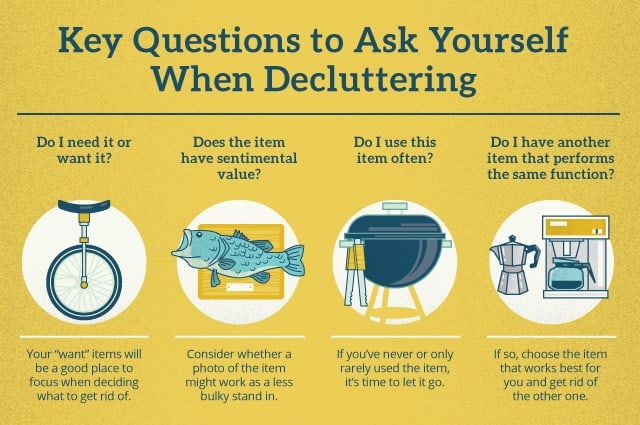If you’re a senior who has decided to simplify life and start hunting for a smaller home, you know that in addition to the excitement there is some anxiety that creeps into your heart. Will you like your new neighborhood? Will you have enough room when family visits? Fortunately, you can address these causes for concern by knowing exactly what to look for when you hunt for a smaller home.
1. Decluttering and Downsizing are Necessary but Not Necessarily Easy… or Fun
One of the toughest aspects of downsizing is decluttering. Typically, seniors who start considering moving to a smaller home realize just how many belongings they have. Many also find items that belong to their children. While it may be refreshing to return your children’s childhood toys to them, it’s more difficult to sort through your possessions and decide which to keep and which to donate, sell, give away or trash.
Certainly, going through items that have sentimental value can be painful. You may feel overwhelmed by the sheer number of items you own, and you may feel guilty about parting with items that you’ve had for several years.
The key to decluttering is to keep the ultimate benefits in mind: you’ll save money because by not packing as many belongings, you’ll be able to move into a smaller home that’s easier to maintain and afford, and stay safer as you age in place because you won’t have as many items to trip over. Begin the process by making a keep pile, a garbage pile, and a sell/donate pile. Then, be honest about which items you want to keep and which you can part with to start a new life in a new home.
2. Knowing How Much Space You Need is a Must
It may be daunting to look at the square footage of your current home and compare it with that of new homes, but remember that you won’t need to fit as many items into your new home. Downsizing works only when you commit to reducing possessions and home size. You’ll pay less for a smaller home, and you’ll have lower energy bills and maintenance costs.
Fortunately, after you’ve decluttered, you’ll know exactly how much space you need. If you kept your bedroom suit, look for houses featuring master bedrooms with enough square footage for your furniture. Similarly, if you enjoy cooking and entertaining, look for homes with larger kitchens and open floor plans. Smaller homes feel larger when they have space where you need it.
3. It Really is All About Location
When you begin searching for a smaller home, you need to know where to look. If you’re moving to be close to family, decide how close you want to be. You may not want to be in the same neighborhood because you don’t want to become a full-time babysitter for your grandchildren. But, you probably want to be close enough for family dinners and the occasional sleepover at grandma’s. In that case, consider a neighborhood that’s a short drive from your grandchildren.
If moving closer to family is not a consideration, look for a smaller home in a more temperate climate than the one in which you currently live. That doesn’t mean you need to move to Florida, however. In fact, college towns like Athens, Georgia, top the 2017 list of best places to retire in the United States. Other considerations such as cost living, access to quality medical care, crime rate, air quality, and volunteer and community engagement opportunities factor into the relocation decision, too.
Once you select an area in which to set your house-hunting sights, conduct research to choose a neighborhood that will help you feel at home. When you have a couple of neighborhoods in mind, visit them and get an impression. Do residents take care of their homes and yards? Are there shops and restaurants that look enticing? Can you picture yourself living here and taking a walk? Of course, if you see warning signs like abandoned buildings, an abundance of homes for sale, or signs of vandalism, you should reconsider your neighborhood choice.
Seniors who want to downsize should remember that decluttering is a necessary part of the process that helps you select a house that is the right size. You also need to choose a location and neighborhood that fits your lifestyle. The extra effort and planning will pay off once you’ve moved into your new place and you’re less bogged down with possessions and extra upkeep, giving you time to live your golden years to the fullest.
Article by:
Marie Villeza
Elderimpact.org
info@elderimpact.org
Image via Redfin

It helps a lot when you explain the importance of considering what items you can get rid of during a move in order to declutter your house. My grandmother would like to move to a home that doesn’t have any staircases since her weak knees make it difficult for her to maintain her balance, but she needs to find someone that can help move the large tables out of her basement. Maybe it would be best for us to find an expert that can help her with the relocation process.